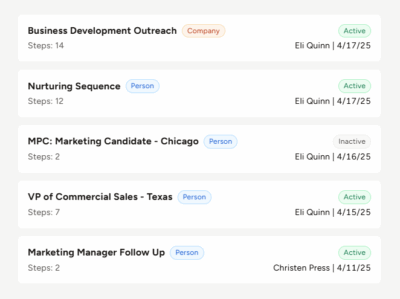From culture fit to work history, recruiters and hiring managers have a lot of items to cross off the list to ensure they find the right candidate for the position. Hiring mistakes can end up costing organizations valuable time and money. That’s why background screening can be the most crucial element of your recruitment and hiring process.
Background checks are a critical tool for verifying a candidate’s information. An efficient screening process can help recruiters and hiring managers reduce potential liabilities, make more informed hiring decisions, and streamline the hiring process.
What are Pre-Employment Background Checks?
A background check is a tool used by recruiters, hiring managers, and organizations to verify a job applicant’s professional and personal history. Background searches can confirm an individual’s identity, education and work experience, criminal history, and other relevant details. A thorough screening process can help your organization reduce liabilities and make more informed hiring decisions, saving you time and money in the long run.
Background searches can include various types of searches. Let’s explore common types of background checks:
- Criminal background checks search and review an individual’s criminal history, including previous arrests, convictions, and pending charges. Criminal background checks typically use a database composed of millions of records from county and state administrative courts, departments of corrections, and third-party sex offender databases.
- Employment, education, and professional license verifications confirm the accuracy and validity of a candidate’s work experience, education history, and any other professional licenses they may have stated on their resume. These can help ensure candidates are not only who they say they are, but also validate any relevant skills and experiences for the role.
- Form I-9 and E-Verify confirm that a candidate is legally authorized to work in the US.
- Credit and financial checks can help reduce the risk of fraud for candidates handling financial or confidential information. Common reports that include employment credit reports, bankruptcy filings, business credit reports, and lien and judgment filing searches.
Benefits of Background Screening for Recruitment and Hiring
Background checks offer a wide range of benefits. While hiring the wrong fit can cost your organization time and money, it can also negatively impact office culture, brand reputation, and more. Let’s explore how background screening can help improve your recruitment and hiring strategy.
Hire More Qualified Candidates, Faster
Did you know that organizations utilizing background screening in their recruitment process are 2x more likely to improve their quality of hire and 3x more likely to improve their time to fill a position? A thorough background check can help ensure that a candidate has the necessary skills and knowledge to perform the role’s duties, therefore reducing the likelihood of hiring the wrong fit and improving the quality of your new hires.
An efficient background screening process can also improve the time it takes you to fill a position. Many employers try to speed up the process by cutting corners, however doing so does not necessarily guarantee a quicker turnaround. Partnering with an accredited screening provider can improve your time to hire by finding and vetting qualified candidates quickly and accurately.
Improve Candidate Experience
With so much competition for top talent, a positive first impression is crucial. Background checks can help employers improve their hiring process, but they can also create a poor candidate experience when not handled properly. In fact, 38% of employers claim to have lost job applicants due to a negative candidate experience.
You know an efficient background screening process can improve your hiring strategy, but it can also help you gain a competitive edge, improve your brand image, attract more candidates, and create a better overall experience.
Mitigate Risk and Maintain Compliance
Compliance regulations are complex. Whether you are a large business with a compliance team or a small business navigating the landscape on your own, maintaining compliance with industry, state, and federal regulations is a big responsibility. The right background screening partner has the knowledge and ability to help your organization comply with the necessary regulations.
Background screening can also reduce your liability in the event of a workplace incident or negligent hiring lawsuit. Conducting background checks protects your clients, employees, and business. Comprehensive background checks help recruiters demonstrate they have thoroughly evaluated the candidate’s qualifications and mitigated known risks.
Boost Efficiency and Productivity
Recruiters and hiring managers have more important tasks than manually verifying candidate information. An efficient background screening program can reduce manual processes, giving valuable time back to recruiters to focus on more strategic initiatives. When you screen with Verified First, the average turnaround time is almost 9x faster.
Utilizing an accredited background screening provider improves accuracy and helps ensure your new hires have the right skills, experience, and attitude to succeed in the position, improving the efficiency and productivity of your recruitment and hiring strategy.
Building an Efficient Background Screening Program
Establishing a background screening process that elevates and strengthens your recruitment and hiring programs doesn’t have to be difficult. Here are four steps to help recruiters build an efficient background screening program:
#1—Understand Your Objectives, Needs, and Goals
Before you begin building your screening program, take some time to understand and outline the objectives, needs, and goals of your background check process. Taking time to do this will give you a solid foundation for your screening program, as well as help you determine which tools, technologies, and partners will best suit your goals and needs. During this phase, define your workflow, establish roles and responsibilities, and resolve potential roadblocks.
#2—Develop a Written, Comprehensive Screening Policy
Establishing a clear and comprehensive policy can help recruiters, employers, and potential candidates understand all the expectations and requirements of your screening program. This written policy should outline the type of checks being conducted, the reasons for screening, the procedures that should be followed, disqualification criteria, and any relevant compliance information.
#3—Conduct Necessary Training
Whether you are running your own screening program or utilizing a background check provider, recruiters and hiring managers must be properly trained in order to ensure adherence to the standards defined in your screening policy. Background check training should cover regulatory compliance, background screening best practices, organizational needs, and understanding of the timing and workflows.
#4—Partner with a Background Screening Provider
Recruiting, hiring, and onboarding new employees can be particularly challenging without the right tools and technologies in place to support your needs. The right screening provider works with your organization’s goals and unique needs to help streamline your recruitment and hiring process from start to finish.
Efficient Recruiting with Verified First and Top Echelon
A comprehensive background program helps recruiters and hiring managers attract and retain top talent. However partnering with a background screening provider, specifically one that already integrates with your chosen recruiting software, might be the answer to your recruitment and hiring needs that you have been looking for.
Verified First seamlessly integrates with Top Echelon, allowing users to manage and order background checks, verifications, and more all within the Top Echelon platform. Our one-click browser integration can help you maintain compliance, streamline your recruitment and hiring processes, and reach your organization’s goals.
See how you can start screening in seconds!








